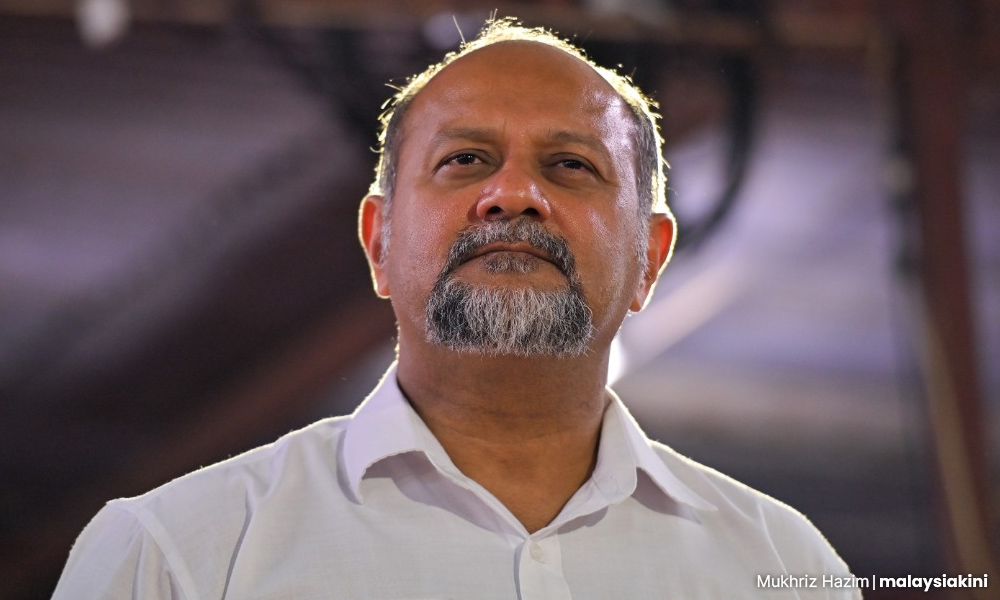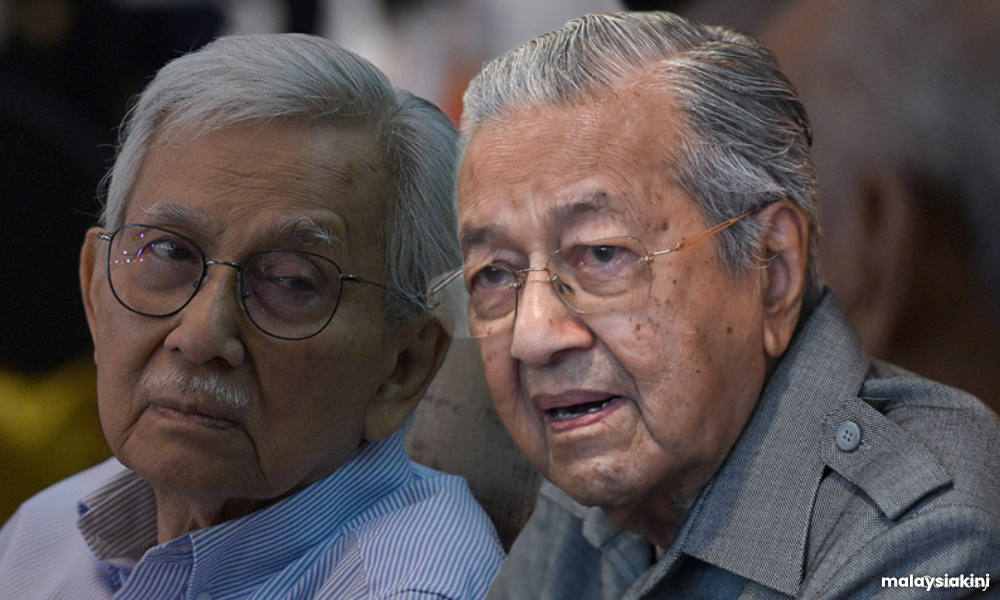"No, I'm not an Indian. I'm a Malay because I do not know the Indian language, and that was a long, long time ago.”
"I'm now 100 percent a Malay, I speak Malay and practise Malay customs and traditions.”
Dr Mahathir Mohamad’s latest and most provocative media appearance on Thanthi TV, a news channel in Chennai has produced a firestorm of fierce criticism.
Leaders of the Indian community, the main target of his interview comments, took strong exception to his allegation that Malaysian Indians were not completely loyal to the country as they were still inexorably tied to their country of origin.
Perhaps the kindest response came from MIC president SA Vigneswaran.
“Just ignore him if he talks about loyalty; we have other work.
“Loyalty is a concept alien to Tun M because he was not loyal to Umno, Bersatu and Pakatan Harapan, which appointed him prime minister in 2018.”
DAP deputy national chairperson Gobind Singh in his statement noted: “The Federal Constitution clearly recognises … that except as allowed explicitly by the constitution itself, there shall be no discrimination against citizens on the grounds of religion, race, descent, place of birth, or gender in any law.”

Gobind added that it was widely accepted that many Malaysians spoke more than one language, with most being fluent in Bahasa Malaysia and their mother tongue, including Chinese, Tamil, Iban, or Kadazan.
Former national unity minister in Mahathir’s Harapan cabinet, P Waytha Moorthy, in his party’s open letter on “Pendatang or Rakyat: Assimilation or Acceptance” provided this rebuke: “Assimilation was never in the slightest imagination of the Malay rulers, the British colonialist power and our founding fathers.
“Please peruse the parliamentary debate of the Federal Legislative Council Malaya that approved our Constitution in 1957.
“There was a great atmosphere of acceptance, coexistence, and determination to develop Malaya further as a genuinely united Malayan race and prosperous nation.
“There were no objections from any races to these arrangements laid before the Constitution to ensure the continued prosperity of Malaya.”
Perikatan Nasional and Muda’s response
No prominent Bersatu or PAS leader has criticised Mahathir or is willing to debate his contention that only fully assimilated non-Malays could be considered as loyal.
This indicates possibly their agreement that two classes of loyalty and citizenship based on racial heritage should be expounded to capture the support of the Malay constituency.
PN member, Gerakan, despite expressing disappointment and disagreement, argued that Mahathir's stand would not sway public support for PN.
Party president Dominic Lau reaffirmed that the opposition coalition would continue seeking Mahathir's advice for the four states governed by PN.
According to Muda deputy president Amira Aisya Abdul Aziz, Mahathir should apologise for his comments. To her, accusing the Indian community of being disloyal to the country could be misused by extremist groups whilst adding that Malaysians' loyalty to the country should not be underestimated.
The response from lower-level government party leaders has been generally equally condemnatory. A PKR division leader went on record to say that the party intended to lodge at least 50 police reports against Mahathir’s “hate-filled rants”.
Other ripple effects of Mahathir’s interview
While no follow-up is likely to arise from the police reports and other expressions of concern on Mahathir’s interview, other ripple effects have emerged.
One of the most noticeable is that it has prompted renewed public scrutiny of Mahathir’s record of leadership and the legacy that he is leaving the country.
The English language social media has been especially active and critical of this possibly last hurrah of Mahathir in his attempt to influence the direction of the nation’s politics and future development.
Commentators have gone to town to upbraid Mahathir for the toxic culture of rampant corruption, cronyism and privatisation/piratisation which damaged the nation’s economy after he became prime minister in 1981.
Also prominent in the critiques is Mahathir’s alleged personal responsibility for the financial scandals and losses that provided the backdrop to Malaysia’s crash during the 1997 financial crisis and the steady decline in the nation's economic rating when compared to other Asian countries.
Given his style of imperial leadership, belief in his superior knowledge of economics and disdain for any form of dissent, the list of Mahathir’s financial and economic mismanagement and malfeasance, according to some critics, covers every major financial setback that took place during his two decades as prime minister.
Maminco, Bank Bumiputra Finance, Forex Market Gambling, Perwaja Steel, and others - the billions of ringgit losses of these Mahathir follies was the tip of the national fiscal iceberg meltdown which Mahathir has been accused of being responsible; but for which he has not admitted to partial ownership and regret.
Another ripple effect is the attention that Mahathir has generated on what can be best described as the skeletons in his family closet.

These range from his dealings with Daim Zainuddin, reputed to be the richest man in the country, who is now under investigation for alleged corruption and money laundering; and the extraordinary wealth of his children, with Mirzan currently being investigated by the MACC authorities, and asked to declare his assets within and outside the country.
Recovering illicit funds
Malaysia has long been identified as among the world’s biggest exporters of illicit money.
Hence, the pursuit by Prime Minister Anwar Ibrahim of grand corruption by individuals in the attempt to recoup some of their illicit gains to shore up the national treasury is regarded by many Malaysians as long overdue although there are sceptics who see it as selective political play.
The campaign against grand corruption has still a long way to run its course but if scrupulously and diligently pursued, it could bring to light the dark secrets of how some of the alleged enormous ill-gotten wealth accumulated by a few individuals during Mahathir’s time of office has come about.
Can the assimilation issue ever go away?
A good friend who worked on urban politics in Malaysia for his PhD dissertation, James Anthony, provided this comment which is food for thought on why the controversy of assimilation will continue to be at the forefront of political discourse for the ketuanans.
“The likes of Mahathir, for all of their alleged gifts and “breadth” of vision and paper thin, offensive ideas about assimilation on their terms and on and on, what they really want is collaborators.
“The Mahathirs look for, and embrace, collaborators in their quest for consolidation of their own power and the consolidation of ‘their community’s’ religious/ethnic/cultural hegemony.
“Their disguised mantra: You (infidels that you are) come join us on our terms. Remember now, say the Mahathirs, you are guests in our country: we, Malays, are the true sons of the soil.
“You have a place here in our country but only as hewers of wood, carriers of water and (in the case of Indians, as rubber tappers, cheap labour). There are openings for some of you as collaborators - you will be selected by us on our terms.
“As collaborators, you will be put on display to lend legitimacy to the national effort to move our country forward. And part of your job as collaborators is to recruit more collaborators.” - Mkini
LIM TECK GHEE is a former senior official with the United Nations and World Bank.
The views expressed here are those of the author/contributor and do not necessarily represent the views of MMKtT.




No comments:
Post a Comment
Note: Only a member of this blog may post a comment.